
Quality Street
The three-act, James Barrie play opened on November 11, 1901 at the Knickerbocker Theater and ran for a total of 64 performances. The play was produced by Charles Frohman and written by James M. Barrie. A revival of the play opened January 6, 1908 at the Empire Theater and ran for 7 performances.
She appeared as the character Phoebe Throssell. Phoebe is a schoolteacher who simply cannot control her students and who knows virtually nothing about how to teach. A man, Valentine Brown, comes back from the wars and it is revealed that he is in love with Phoebe
The play opened in New York on November 11, 1901.
"Miss Adams came back to open in Barrier's Quality Street in New York on November 11, 1901."
'It is an exquisite bit,' said the New York Sun, 'played with infinite grace and a pathos which there was no gainsaying...In all her career Miss Adams has never touched so deep a note.'"
"The New York Tribune thought :'Miss Adams is once more her seemingly ingenuous self...an innocent and lovely girl, artless, buoyant, piquant, brisk.'"
"Boston was a bit judicial: 'This little lady has faults in her methods and mannerisms which stand out glaringly; but the most critical must admit that she possesses talent of a high order, and that she acts understandingly and never makes a false move...In her masquerade as Libby, she was glorious, and in her dancing she was as light as the thistle down, and as graceful as a young fawn."
=====Matinee Tomorrow: Fifty Years of Our Theater by Ward Morehouse=====
"Charles Frohman's death stunned people of the theater. Daniel Frohman was in his Lyceum studio, reading a new play, when the news reached him. Maude Adams was told upon reaching the Grand Theater in Kansas City for her matinee of Quality Street. She collapsed."
=====The Theatre Handbook and Digest of Plays edited by Bernard Sobel, 1940=====
"Phoebe Throssel, finding that her long-absent lover, Valentine Brown, thinks her greatly changed on his return, dresses herself as an imaginary niece, Livvy, and sets out to win him all over again. She succeeds."
=====Barrie: The Story of J.M.B. by Denis Mackail 1941=====
"In October, Quality Street, starring Miss Adams, was given its first public performance in Toledo, Ohio. Frohman was there, of course, and according to his biographers he felt impelled, after a day or two, to make some changes in the third act.... The play reached New York-where he was responsible for eighteen productions this year-on November 11th, opened there at the Knickerbocker Theatre, and again was an immediate and immense success. it was a vehicle indeed for Miss Adams-no mistake having been made this time about giving her the largest and most consistently sympathetic part-and like The Little Minister it ran right through the season, with a handsome profit for all concerned. She didn't immediately go out with it on tour, for, in the following season, owing to a mixture of temperament and appendicitis, she vanished for a while from the boards. "
=====Barrie: The Story of a Genius by J.A. Hammerton 1929=====
He (Barrie) had written a new play-one other than Quality Street, and this we must regard as the bridge whereby he crossed from Thrums to that new wonderland of make-believe in which he was to wander with so much you to himself and delight to his audiences for many years to come. In this entirely charming play, where his absolute mastery of stage technique is placed beyond all cavil, we find ourselves in the realm of pure romance, and he takes us there trailing fragrant clouds of Thrums; the Misses Susan and Phoebe Throssel, their Blue-and-white room, and their little school at Quality Street in the days of the Napoleonic Wars, are none other than our friends Ailie and Kitty of the Dove Cot magically translated."
To Miss Maude Adams fell the distinction of being the first to interpret to the world the charming character of Phoebe Throssel. This took place at the town of Toledo, in Ohio, early in the autumn season of 1901, and when the play was brought to New York on November 11th, at the Knickerbocker Theatre, the actress scored another of her historic successes and the dramatist had taken one more step towards his eventual ascendance in the Anglo-American theatre.
=====Charles Frohman:" Manager and Man by Issac F. Marcosson and Daniel Frohman, with an Appreciation by James M. Barrie. 1916=====
The time was now at hand when she once more took the fascinating Scot by the arm. She now appeared in his "Quality Street" a new play with the real Barrie charm, in which she took the part of an exquisite English girl whose betrothed goes to the Napoleonic wars. She thinks he has forgotten her, and allows herself to externally fade into spinsterhood. When he comes back he does not recognize her. Then she suddenly blooms into exquisite youth-radiant and beguiling-and he discovers that it is his old love.
"Quality Street" was tried out in Toledo, Ohio, early in the season of 1901. On the opening night an incident occurred which showed Frohman's attitude toward new plays. The third act dragged somewhat toward the end, evidently on account of an anti-climax. On the following day Frohman asked his business manager to sit with him during the third act, saying:
"Last night Miss Adams played this act as Barrie wrote it. This afternoon she will play it as I want it."
The act went much more effectively, and it was never changed after that matinee performance.
"Quality Street" was another of what came to be known as a typical "Adams success."
=====Matinee Tomorrow: Fifty Years of Our Theater by Word Morehouse; Whittlesey House, 1949======
Charles Frohman's death stunned people of the theater. Daniel Frohman was in his Lyceum studio, reading a new play, when the news reached him. C. B. Dillingham sank into a chair in his office at the Globe and broke into tears. Maude Adams was told upon reaching the Grand Theater in Kansas City for her matinee of Quality Street. She collapsed. Preparations were made to cancel the performance, but Miss Adams told the management that she would go on. She did go on, with her eyes puffed and tear stained, and her voice broke frequently in her opening scenes, but she got through. Her road manager received the Kansas City press, which suddenly besieged the theater, and spoke for her. No, Miss Adams could not be seen. Yes, she would give her evening performance. Yes, she would continue her Western tour, for the time being. No -- and the newsmen had withheld this question to the end -- Miss Adams had not married Mr. Frohman. "He was not her husband," said that road manager, and his own voice was now breaking, "but he was the greatest friend of her life."
=====Essays on Modern Dramatists by William Lyon Phelps; Books for Libraries Press, 1921=====
As a series of pictures, Quality Street has all the charm of Cranford; as a stage-play it is a delicate bit of confectionery, a Whimsy cake.
=====American Theatre: A Chronicle of Comedy and Drama, 1869-1914 by Gerald Bordman; Oxford University Press, 1994=====
Winsome Maude Adams gained further laurels when Charles Frohman presented her as Phoebe in James Barrie's Quality Street ( 11-11-01, Knickerbocker). The play was set in Napoleonic times, and its impoverished, schoolmarm heroine must resort to disguise to ensnare her vacillating soldier-suitor.
My synopsis of Quality Street
The book I am reading this from bears a copyright date of 1918 on one page but on another page the date of 1924 is given. Either way, it's over eighty years old.
Act I
The play takes place during the Napoleonic wars. The characters include Susan and Phoebe Throssel, Miss Willoughby and her sister Miss Fanny and Miss Henrietta Turnbull, among others. Miss Fanny and her sister, Miss Willoughby, consider themselves old maids but are interested in Miss Phoebe's suitor, a V.B.
Early in the play a recruiting sergeant is talking to Miss Phoebe in their house. She asks if he's killed people and he says "dozens" . Miss Phoebe later tells her sister that money they had invested has apparently been lost, basically stolen which means they will have very little money to live on.
Valentine Brown is the name of the man that Pheobe thinks plans to marry her, but he reveals that he has enlisted in the war. It turns out he hadn't been planning on marrying her at all. It also turns out that he was the one who suggested they make the investment that ended up failing.
The sisters decide that they will start a school for "genteel" children.
Act II
This act starts ten years later just after the battle of Waterloo with their school set up and going and Miss Phoebe having aged considerably. Valentine Brown (V.B) returns having lost his left hand in the war. He talks to Miss Phoebe.
Later a former student and his girlfriend visit but only to make fun of them, apparently.
There is a major ball taking place, but Miss Phoebe does not plan to attend it.
One very interesting line from Miss Phoebe goes: "It is every woman's birthright to be petted and admired; I wish to be petted and admired."She dresses up in what was to have been her wedding gown and "pretties herself up", as they would say. V.B. visits and does not recognize her as Miss Phoebe and he is told that she is really a niece.
He invites her to the ball, still not knowing that she is Miss Phoebe.
Act III
Livvy/Phoebe is attending her third ball. She fakes fainting in order to avoid being seen by Miss Henrietta and Miss Fanny.
She ends up being seen by them but they mistake another girl for Miss Livvy and admit they had been following her trying to find out what was going on. Valentine Brown talks to her and confesses his love for Miss Phoebe, still not realizing that Miss Livvy and Miss Phoebe are one and the same person.
He even admits he would like to marry Miss Phoebe.
Act IV
Valentine Brown visits Phoebe in her house and professes his love for her. It becomes more and more difficult to keep the truth about Livvy/Phoebe hidden, but it turns out that Valentine Brown has known about the deception for some time.
He also finds out that the money he invested for them had been a bad investment loss.
He manages to fake Miss Livvy's leaving so the neighbors will think that she is gone forever, then he returns and asks Miss Phoebe to marry him and she accepts.
Reviews
Miss Adams as Phoebe Throssell is once more her seemingly ingenuous self, no longer burned with the strain of emotions that she does not feel and cannot express, but an innocent and lovely girl, artless, buoyant, piquant, brisk, sometimes demure, sometimes mischievous, now pensive in repose, now tantalizing in pretty coquetry, now impulsive with pouting resentment, now sweetly wayward and pert, and now arch and reckless in the perversity of a rebellious heart. Tribune, Nov. 12, 1901
[As Livvy] she exhibits all that effervescent spirit of archness, gayety, and coquettishness, all the sparkling variety of girlish mood, that have so often delighted her admirers. The chances for acting of the higher sort are few, but she marks the contrast between the worn and saddened woman and the volatile girl, intoxicated with her new freedom, with considerable skill, the demureness of the one being an admirable foil to the buoyant, mischievous animation of the other. The Critic, Dec. 1901
Miss Adams acting is altogether refreshing and delighftul. It is the personification of girlish grace abounding in a thousand artless little touches which no one knows as well as she how to give to heroines of the stage. There is hardly a touch of passion in it, but it ripples with pretty sentiment and whimsical humor. The little picture of hopeless disappointment which she gives at the parting of the first act is inimitable. The World, Nov. 12, 1901
By the magnetism and charm that is so richly hers, she made Phoebe Throssell one of her most winsome portrayals. No great demand was made upon her art. She had but to be herself, as the stage has always known her, girlish, natural, buoyant, and sincere, and all these she was, and showed besides the girl's love and sorrow and happiness. She made a fetching picture in the garb of long ago, and though she has not another Lady Babbie to play, one could not but rejoice to see her in her element again. Dramatic Mirror, Nov. 16, 1901
Miss Adams does some lovely acting, so good, indeed, that it much increased my belief that in auspicious circumstances she might take an artistic position that would be proof against the years. The Bookman, Feb. 1902
There was no doubt of the pleasure of the audience in the performance. There were plenty of opportunities for laughter, and of these the auditors took every advantage. And there were many pretty moments of gentle pathos, and to these was paid the tribute of sympathy and warm applause. New York Times, Nov. 12, 1901
The house was crowded to the doors by a notably fine audience, and upon her first entrance she received a welcome of the wamrest description. the applause was renewed at every opportunity, and was especially vehement and prolonged at th end of each act, compelling her to come many times before the curtain to make her acknowledgments. Evening Post, Nov. 12, 1901
The spectacle of a woman making a speech before the curtain is always one which fills an old theatre-goer with dismay, but Miss Adams had sufficient tact to make her speech as informal as possible. She appeared on the stage, with the curtain raised, and said, 'I cannot thank you [enough]; you are too good to me.' It was enough, and it stilled the wild desires of the seekers for extemporaneous oratory from people whose business it is to declaim other people's lines. New York Times, Nov. 12, 1901
Best of all, it permits Miss Adams to be her own delightful self, rich with the artless graces of young womanhood and full of the spontaneous evidences of her spontaneous and always pleasing personality. The World, Nov. 12, 1901
Ads for the Play
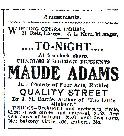 The Post SAtandard, Nov. 9, 1901 |
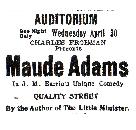 The Des Moines Daily Leader, April 26, 1902 |
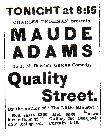 The Nebraska State Journal, April 28, 1902 |
 Nevada State Journal, May 20, 1923 |
General Articles on the Play
 The Lima Times Democrat, Oct. 17, 1901 |
 The Nebraska State Journal, Oct. 20, 1901 |
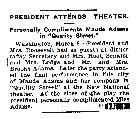 The Idaho Daily Statesman, March 9, 1902 |
The first article is mainly a description of the play. The middle article notes that the title of the play was originally going to be 'The Ladies of Quality Street.' The third article notes that one performance was attended by then-president Theodore Roosevelt.
Both Maude Adams and Play seen positively
 The Lincoln evening News, April 29, 1902 |
 The Fort Wayne Sentinel, March 15, 1902 |
Maude Adams positive, play not so good
 The Portsmouth Herald, Nov. 14, 1901 |
 Des Moines Daily Leader, May 1, 1902 |
 same |
 same |
 same |
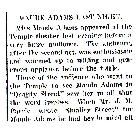 Fort Wayne News, May 7, 1902/td>
|  same |
 same |
Both seen negatively
 The Post Standard, Nov. 10, 1901 |
 same |
 The Nebraska State Journal, May 4, 1902 |
The revival of the play
 Nevada State Journal, May 16, 1923 |
 Nevada State Journal, May 20, 1923 |
1902 Playbill
The follow is the actual book of the play in .zip format. Right click on it and choose save.
The Book of the Play
|





